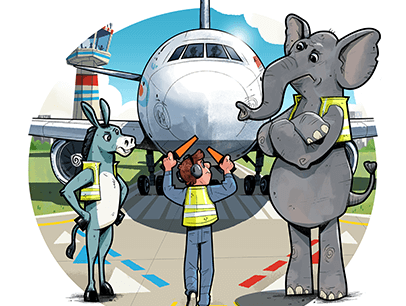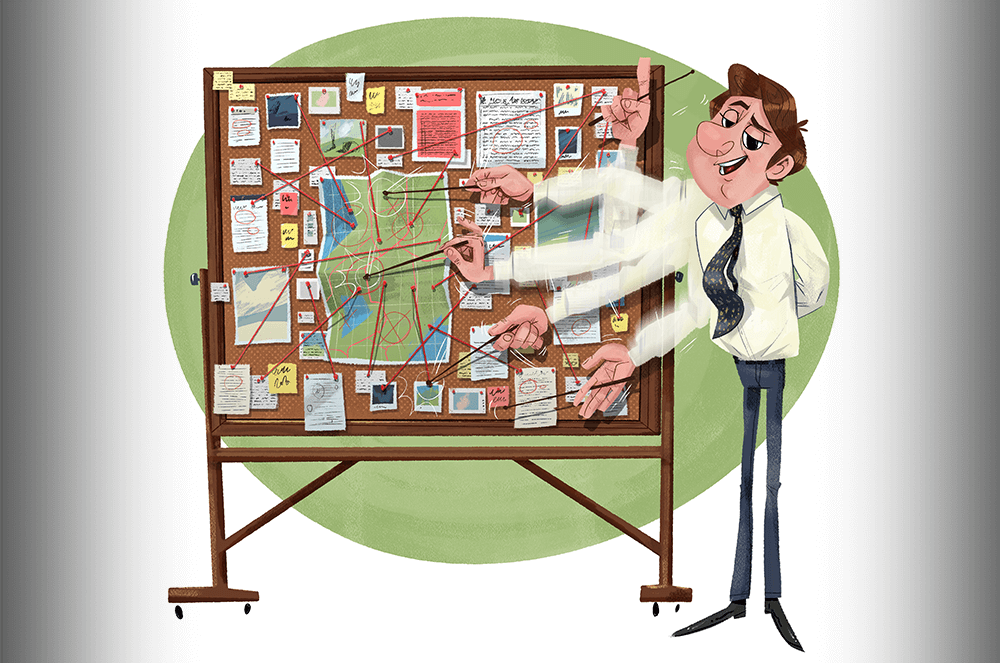
I remember those innocent, carefree times when I could write about political rhetoric, skewer any political party in equal proportion for their flying, fallacious flapdoodle, and everyone would have a good laugh. Well, as we all know, nobody’s laughing anymore.
In fact, you can’t even say “politics” without everybody’s adrenal glands pumping out stress hormones like a garden hose. This is a shame, because for people who care about language, politics is still the funniest thing going, an enormous seam where miners for comedy gold never fail to strike it rich. No matter how much politics has changed, remember—it’s still the same game: Promise people you’ll serve their interests so they’ll vote you into a position where you can serve your own. That’s pretty funny.
It’s basically a shell game and political rhetoric is how they cover it up. Think about how many times we’ve heard “Let me be clear.” Just those four words yield a duet of guffaws. Let me be clear? I’m sorry—have we not let you be clear? Have we yelled, “Please, don’t be lucid and transparent! Confuse us with obfuscation, sophistry, and pure drivel!” Or when they say, “Let me be clear.” Gee, that sounds like being clear is something new for you. Haven’t you always been clear? You’re not hiding anything, are you?
It’s really quite amusing. Here’s a person who thinks he or she is scoring points for honesty when in fact they’re practically shouting that whatever they’re saying at the moment is a sharp deviation from their normal practice of dishonesty. That’s funnier than nutrition information on a bag of buttered popcorn.
Now, I know these times are different. (And if I hear “unprecedented” one more time, I’m going to say, “This unprecedented usage of the word unprecedented is setting an unprecedented precedent.” Maybe that will get them to shut up and reach for a thesaurus.
And yes, I know about cancel culture, which is ridiculous. When you cancel a person, it’s final. It would be wiser to postpone them, which offers the possibility of reconciliation. You never know when you might need to borrow their leaf blower.
Back to this matter of today’s political discourse. According to the Pew Research Center, 85% of Americans think it’s too negative. Well, it’s supposed to be. Let us remember that no matter how soaring the rhetoric, the single, immutable message of political discourse is and always has been the same: Everything’s wrong and it’s your fault. What concerns me more is the 15% who apparently don’t think politics is too negative. What do they want—cage boxing?
When you cancel a person, it’s final. It would be wiser to postpone them.
Another Pew finding reports that a majority of voters don’t think a politician should mislead the public about his or her opponent’s record. Well, of course they shouldn’t. That’s lying! Unfortunately, America’s laws against false advertising only apply to commercial products. General Mills has to print how much sugar is in Honey Nut Cheerios but Senator Claptrap can stuff a hundred pounds of pork into his spending bill and never say a word.
Here’s another interesting fact: People don’t like it when politicians call each other stupid. That’s funny, because voters call politicians stupid all the time. Apparently, it’s a privilege we prefer to reserve for ourselves. I think the citizenry is being a tad prudish here. Look back to colonial times and you will find General Charles Lee calling George Washington—George Washington, for heaven’s sake!—a “dark, designing, sordid, ambitious, vain, proud, arrogant, and vindictive knave.” I’ll take stupid over that any day.
Look back even further and things really come into perspective. As you may recall, Julius Caesar presided over the Roman Senate until he offended its members by wanting too much power. They didn’t call him stupid. They simply effected a plot by which they could call him dead. And so it has gone through the ages, with exile, imprisonment, and the executioner’s block all acting as the means for settling political differences. Compared to that, stupid seems downright polite.
No, I am not naive. I know today’s political differences are a bit more divisive than what we are used to. My own family contains a multitude of political positions. We deal with it at Thanksgiving dinner, where everybody gets to express their views without interruption or criticism. Then we ask: Which is more important, family or politics? If anyone says politics, we still love them ... but they don’t get any pie.
John Cadley is a former advertising copywriter, freelance writer, and musician living in Fayetteville, New York. Learn more at www.cadleys.com.



 Previous
Previous

 Previous Article
Previous Article

